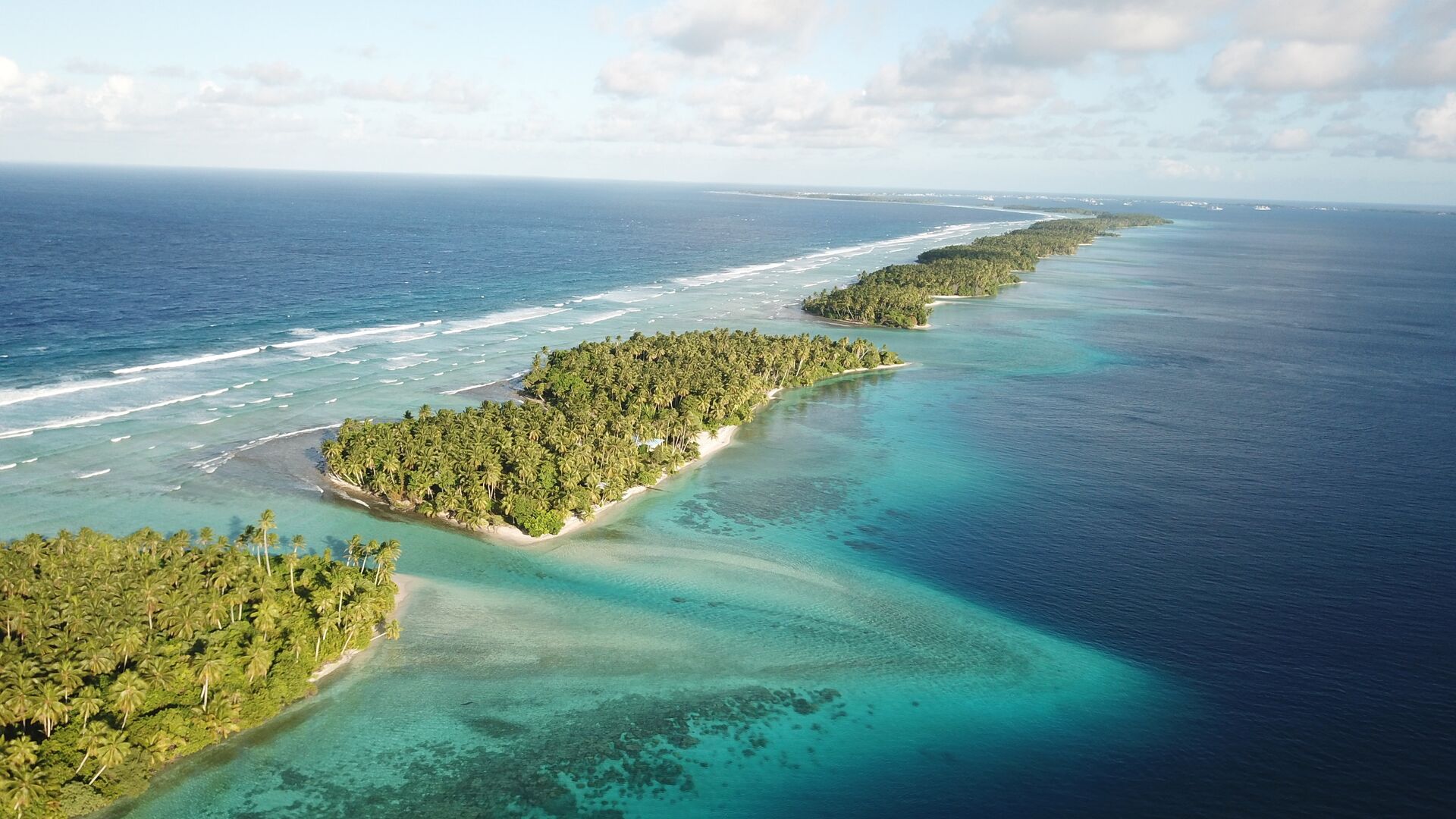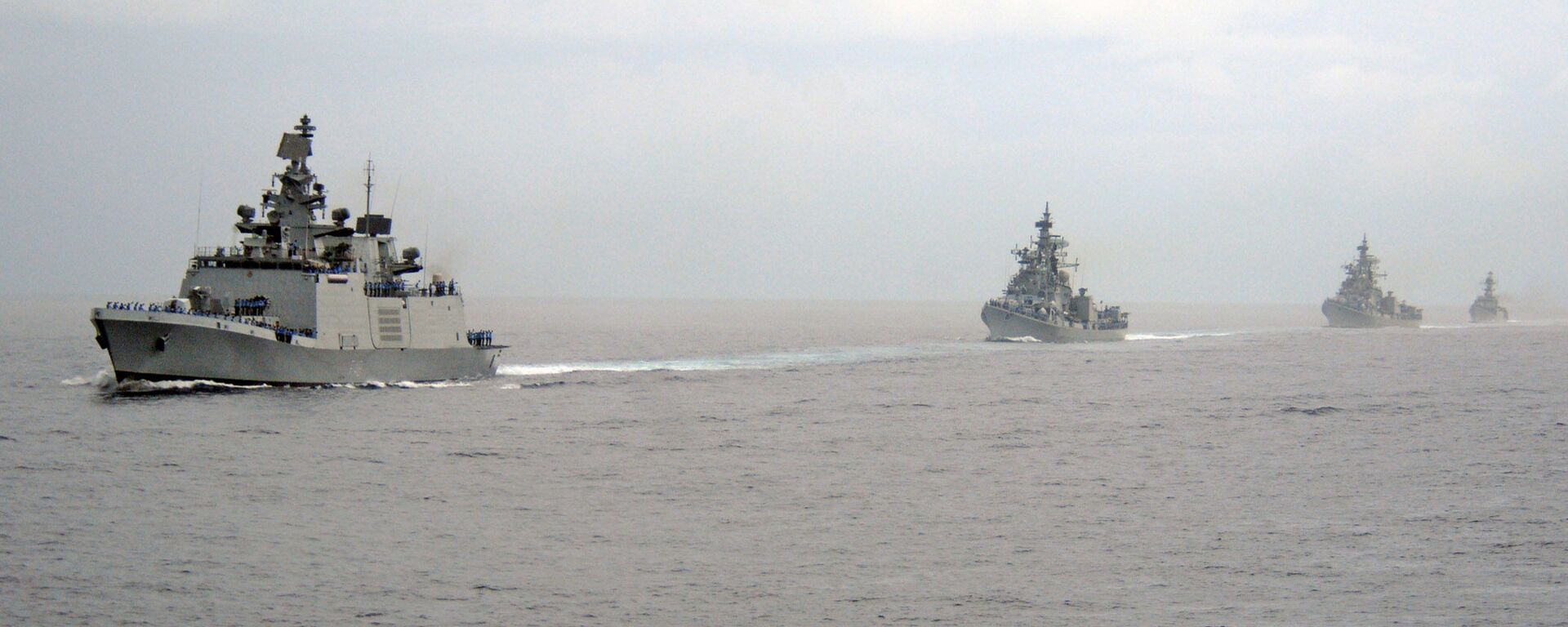https://sputniknews.in/20240715/navigating-pacific-waters-indias-strategic-stance-on-marshall-islands-7847351.html
Navigating Pacific Waters: India's Strategic Stance on Marshall Islands
Navigating Pacific Waters: India's Strategic Stance on Marshall Islands
Sputnik India
Delhi signed a memorandum of understanding (MoU) to finance four community development projects in the Marshall Islands on Monday, with External Affairs... 15.07.2024, Sputnik India
2024-07-15T20:48+0530
2024-07-15T20:48+0530
2024-07-16T14:04+0530
narendra modi
india
indo-pacific
chennai
government of india
pacific ocean
indian ocean
indian air force (iaf)
indian navy
indian army
https://cdn1.img.sputniknews.in/img/07e8/07/10/7851902_0:376:4000:2626_1920x0_80_0_0_7f360951fb975fe1e2a99c10db54253f.jpg
The south-Asian giant believes that its support for infrastructure development in the Marshall Islands plays a vital role in its overarching strategy to enhance capacity, capabilities, and connectivity across the Indo-Pacific region, according to experts.“India has had longstanding relations with the Pacific Islands, including the Marshall Islands, primarily through the Indian diaspora that settled there centuries ago,” Captain Sarabjeet S. Parmar (Retd.), a distinguished fellow at the United Service Institution of India (USI), told Sputnik India.He stressed that India’s assistance in infrastructure development in the Marshall Islands “is crucial to its broader strategy of strengthening capacity, capabilities, and connectivity in the region.”The Marshall Islands, strategically positioned within the Pacific Island Forum, see India's engagement in their development as consistent with its Indo-Pacific strategy, notably within the framework of Security and Growth for All in the Region (SAGAR) policy, the captain noted.Likewise, Parmar emphasised that the progress in the Marshall Islands is consistent with India's engagements under Forum for India–Pacific Islands Cooperation (FIPIC), which aims to “strengthen ties and support sustainable development across Pacific Island nations.”Meanwhile, India underscores its dedication to assisting the Pacific Islands in tackling issues like climate change and disaster preparedness, showcasing its extensive global engagement and collaborative initiatives, according to the captain.India's Strategic Engagement with Smaller Islands: Geopolitical Significance and Regional InterestsIn the broader context of India's engagement with smaller islands, Commodore R.S. Vasan (Retd.), director of the Chennai Centre for China Studies (C3S), underscored the islands’ “geopolitical significance amidst shifting power dynamics in Oceania” in a conversation with Sputnik India.He pointed out that recent agreements aim to “prevent unilateral dominance and enhance collective strategic interests beyond the Indian Ocean region.”Vasan emphasised India's ACT East policy as pivotal in establishing physical and strategic connections with Southeast Asian and smaller island nations, citing Prime Minister Narendra Modi's past engagements.Furthermore, the commodore illustrated India's rapid global ascent and its strategic collaborations with smaller nations in the Indian Ocean and Pacific regions, emphasising the “long-term benefits of these partnerships.”This outreach aligns with India's ambitions to become the world's third-largest economy, intertwining economic growth, strategic interests, and expanding influence in global power dynamics, according to Vasan.He similarly indicated that India, like many others, holds “significant interests in the South China Sea” as part of its broader Indo-Pacific strategy.Charting India's Long-Term Maritime Pacific Island StrategyFollowing Modi's recent visit to Russia, there's a clear intent to bolster investments in the Chennai-Vladivostok route by both countries, which signals a deepening commitment to regional economic ties, Vasan affirmed.The commodore pointed out that India's advancements in satellite technology, exemplified by the successful Agni-Kul satellite launch, are of significant interest to smaller island nations seeking partnerships in space, ocean exploration, technology transfer, and defense strategies, as seen in the BrahMos missile sales.The planned transfer of two BrahMos batteries to the Philippines by 2026 underscores the role of military engagement in fostering relationships with military planners and political leaders, “illustrating India's comprehensive approach to international diplomacy,” the military pundit highlighted.Looking ahead, Vasan disclosed that India has strategically mapped out its long-term engagement with numerous countries, leveraging agreements that secure the presence of its navy, air force, and army in key maritime locations.These strategic focal points in maritime geography enable India to significantly broaden its influence across the Indo-Pacific region, Vasan contended.In the same vein, according to the analyst, these developments will further enhance India's maritime influence not only through defence collaborations but also commercial initiatives such as shipbuilding, port exchanges, and technology transfers.These advancements, he concluded, signal promising prospects for “India's ambitions as a rising maritime power.”
https://sputniknews.in/20231117/how-india-contributes-to-vanilla-islands-maritime-security--why-it-is-crucial-for-ior-5350999.html
india
indo-pacific
chennai
pacific ocean
indian ocean
us
spratly islands
kuril islands
Sputnik India
feedback.hindi@sputniknews.com
+74956456601
MIA „Rossiya Segodnya“
2024
Swapna Nair
https://cdn1.img.sputniknews.in/img/07e7/09/12/4320104_0:0:681:681_100x100_80_0_0_ca8a7d4d582609272840ffdd1cde7278.jpg
Swapna Nair
https://cdn1.img.sputniknews.in/img/07e7/09/12/4320104_0:0:681:681_100x100_80_0_0_ca8a7d4d582609272840ffdd1cde7278.jpg
News
en_IN
Sputnik India
feedback.hindi@sputniknews.com
+74956456601
MIA „Rossiya Segodnya“
Sputnik India
feedback.hindi@sputniknews.com
+74956456601
MIA „Rossiya Segodnya“
Swapna Nair
https://cdn1.img.sputniknews.in/img/07e7/09/12/4320104_0:0:681:681_100x100_80_0_0_ca8a7d4d582609272840ffdd1cde7278.jpg
india, memorandum of understanding (mou), finance four community development projects, marshall islands, indian external affairs minister (eam) s jaishankar, new delhi’s, sustainable development, pacific islands, marshall islands, indian diaspora, captain sarabjeet s parmar (retd.), distinguished fellow at the united service institution of india (usi), indo-pacific nation, marshall islands, capacity, capabilities, connectivity, sagar’ (security and growth for all in the region), forum for india–pacific islands cooperation (fipic), pacific island nations, india, pacific islands , climate change,, disaster preparedness, global engagement and collaborative initiatives, commodore rs vasan (retd.), director, chennai centre for china studies (c3s), oceania, indian ocean region, india's act east policy, southeast asian, prime minister narendra modi's, south china sea, india's long-term maritime strategy in pacific islands, russia, chennai-vladivostok route, agni-kul satellite launch, space, ocean exploration, technology transfer, and defense strategies, brahmos missile, philippines, military planners and political leaders, international diplomacy, navy, air force, and army, maritime locationd, indo-pacific region, shipbuilding, port exchanges, and technology transfers, maritime power’.
india, memorandum of understanding (mou), finance four community development projects, marshall islands, indian external affairs minister (eam) s jaishankar, new delhi’s, sustainable development, pacific islands, marshall islands, indian diaspora, captain sarabjeet s parmar (retd.), distinguished fellow at the united service institution of india (usi), indo-pacific nation, marshall islands, capacity, capabilities, connectivity, sagar’ (security and growth for all in the region), forum for india–pacific islands cooperation (fipic), pacific island nations, india, pacific islands , climate change,, disaster preparedness, global engagement and collaborative initiatives, commodore rs vasan (retd.), director, chennai centre for china studies (c3s), oceania, indian ocean region, india's act east policy, southeast asian, prime minister narendra modi's, south china sea, india's long-term maritime strategy in pacific islands, russia, chennai-vladivostok route, agni-kul satellite launch, space, ocean exploration, technology transfer, and defense strategies, brahmos missile, philippines, military planners and political leaders, international diplomacy, navy, air force, and army, maritime locationd, indo-pacific region, shipbuilding, port exchanges, and technology transfers, maritime power’.
The south-Asian giant believes that its support for infrastructure development in the Marshall Islands plays a vital role in its overarching strategy to enhance capacity, capabilities, and connectivity across the Indo-Pacific region, according to experts.
“India has had longstanding relations with the Pacific Islands, including the Marshall Islands, primarily through the Indian diaspora that settled there centuries ago,” Captain Sarabjeet S. Parmar (Retd.), a distinguished fellow at the United Service Institution of India (USI), told Sputnik India.
He stressed that India’s assistance in infrastructure development in the Marshall Islands “is crucial to its broader strategy of strengthening capacity, capabilities, and connectivity in the region.”
The Marshall Islands, strategically positioned within the Pacific Island Forum, see India's engagement in their development as consistent with its Indo-Pacific strategy, notably within the framework of Security and Growth for All in the Region (SAGAR) policy, the captain noted.
Likewise, Parmar emphasised that the progress in the Marshall Islands is consistent with India's engagements under Forum for India–Pacific Islands Cooperation (FIPIC), which aims to “strengthen ties and support sustainable development across Pacific Island nations.”
Meanwhile, India underscores its dedication to assisting the Pacific Islands in tackling issues like climate change and disaster preparedness, showcasing its extensive global engagement and collaborative initiatives, according to the captain.
India's Strategic Engagement with Smaller Islands: Geopolitical Significance and Regional Interests
In the broader context of India's engagement with smaller islands,
Commodore R.S. Vasan (Retd.), director of the Chennai Centre for China Studies (C3S), underscored the islands’ “geopolitical significance amidst
shifting power dynamics in Oceania” in a conversation with
Sputnik India.
He pointed out that recent agreements aim to “prevent unilateral dominance and enhance collective strategic interests beyond the Indian Ocean region.”
Vasan emphasised
India's ACT East policy as pivotal in establishing physical and strategic connections with Southeast Asian and smaller island nations, citing Prime Minister Narendra Modi's past engagements.
Furthermore, the commodore illustrated India's rapid global ascent and its strategic collaborations with smaller nations in the Indian Ocean and Pacific regions, emphasising the “long-term benefits of these partnerships.”
This outreach aligns with India's ambitions to become the world's third-largest economy, intertwining economic growth, strategic interests, and
expanding influence in global power dynamics, according to Vasan.
He similarly indicated that India, like many others, holds “significant interests in the South China Sea” as part of its broader Indo-Pacific strategy.
Charting India's Long-Term Maritime Pacific Island Strategy
Following Modi's recent visit to Russia, there's a clear intent to bolster investments in the Chennai-Vladivostok route by both countries, which signals a deepening commitment to regional economic ties, Vasan affirmed.
The commodore pointed out that India's advancements in satellite technology, exemplified by the successful Agni-Kul satellite launch, are of significant interest to smaller island nations seeking partnerships in space, ocean exploration, technology transfer, and defense strategies, as seen in the BrahMos missile sales.
The planned transfer of
two BrahMos batteries to the Philippines by 2026 underscores the role of military engagement in fostering relationships with military planners and political leaders, “illustrating India's comprehensive approach to international diplomacy,” the military pundit highlighted.
Looking ahead, Vasan disclosed that India has strategically mapped out its long-term engagement with numerous countries, leveraging agreements that secure the presence of its navy, air force, and army in key maritime locations.
These strategic focal points in maritime geography enable India to significantly broaden its influence across the
Indo-Pacific region, Vasan contended.
In the same vein, according to the analyst, these developments will further enhance India's maritime influence not only through defence collaborations but also commercial initiatives such as shipbuilding, port exchanges, and technology transfers.
These advancements, he concluded, signal promising prospects for “India's ambitions as a rising maritime power.”



